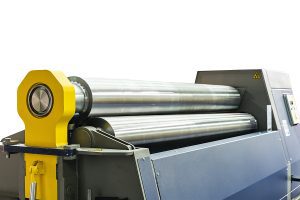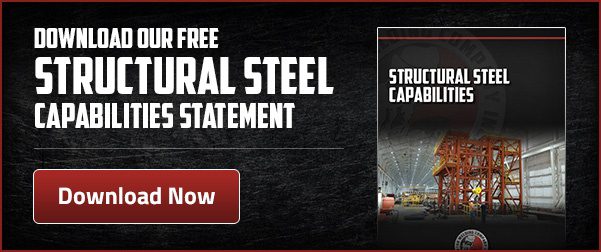What Is Plate Rolling? A Guide to Forming Heavy Steel with Precision
If you’re working with a heavy plate, precision isn’t optional. Structural integrity, load performance, and safety all depend on how your steel is formed. Plate rolling is one of the most efficient methods for shaping metal without compromising its strength or durability. It’s a key process for forming round or curved components that support your most demanding projects.
At Swanton Welding Company, plate rolling plays a central role in custom fabrications like building tanks, ductwork, or structural assemblies. Rolled components provide the strength and accuracy to meet specifications and withstand pressure.
How Plate Rolling Works
Plate rolling transforms flat metal into curved, cylindrical, or cone-shaped parts using a series of large, powered rollers. The process begins by feeding a sheet or plate into the roller machine. As pressure is applied across the steel, the machine slowly bends the plate to match a set radius.
Swanton uses high-capacity, CNC-controlled plate rolls to manage this process with accuracy. These machines can form parts with uniform curves while holding tight tolerances throughout the length of the material. That consistency is vital for parts that must align, seal, or support heavy loads.
Types of Metal That Can Be Rolled
Different applications require different metals, and Swanton Welding is equipped to roll a wide range of materials. Each one has its own strength and bending behavior, which is why proper equipment and skilled operators are essential.
Swanton can roll:
- Mild steel
- Stainless steel
- Galvanized steel
- Aluminum
- AR (abrasion-resistant) plate
Mild steel is most used for tanks and structural parts because it’s strong, versatile, and economical. Stainless steel is often chosen for applications requiring corrosion resistance, while aluminum is useful where weight is a consideration. The AR plate is ideal for high-wear environments, like mining and heavy transport equipment.

Tolerances That Support Long-Term Performance
Tight tolerances matter. A few millimeters off can throw off an entire build, especially in cylindrical or multi-part assemblies. Swanton Welding’s rolling machines can hold tolerances within 1/8 inch on large components. That level of precision prevents misalignment, reduces welding rework, and helps the final product perform as intended.
Key tolerances achieved include:
- Uniform wall thickness
- Consistent diameter from end to end
- Roundness is maintained even on a thicker plate
- Controlled taper for cone-shaped parts
Accurate rolling enables your parts to fit together without requiring force or reshaping on site, which reduces installation time and increases field reliability.
Applications That Depend on Rolled Steel
Swanton’s plate rolling capabilities serve a wide range of industries. From transportation to energy and manufacturing, rolled components are used to build everything from pressure vessels to oversized structural frames.
Some of the most common uses include:
- Fuel and hydraulic tanks
- Cylindrical ducting or exhaust housings
- Structural pipe supports and braces
- Conveyor drums and rollers
- Custom framing for transport equipment
Each part is shaped for purpose, helping your builds meet the physical demands of vibration, loading, and long-term wear.
Why Plate Rolling Beats Other Forming Methods
You could bend steel with press brakes or even cut and weld it into shape. But a rolled plate maintains material integrity better. Instead of being stretched or distorted, the steel is gradually bent into a curve. That means fewer stress points, better strength retention, and more even welds later in the fabrication process.
Plate rolling also allows for:
- Larger part sizes
- Smooth surface finish
- Custom diameters that match your specs
- Less waste due to fewer scrap sections
For assemblies like tanks or ducts, this method reduces the risk of leakage or stress cracking. It’s also more efficient than welding multiple bent panels together.
Swanton Welding’s Plate Rolling Capacity
Swanton Welding has invested in plate rolling equipment that handles oversized material without sacrificing accuracy. This makes it ideal for projects that involve heavy steel or large-scale builds.
Typical rolling capacity includes:
- Plate thicknesses up to 1-2 inches
- Widths up to 10 feet
- Diameters from 12 inches to over 12 feet
Whether you’re fabricating a 500-gallon tank or a structural pipe for a bridge frame, Swanton can shape it to your specifications. The ability to roll large pieces reduces the number of seams, improving both strength and aesthetics.
Complete Fabrication from One Partner
Plate rolling is often just one step in the build. At Swanton Welding, the process is fully integrated into broader fabrication services. That means your rolled components can be cut, welded, assembled, painted, and inspected all under one roof.
Benefits of working with Swanton include:
- CNC cutting for precise layout
- MIG, TIG, and submerged arc welding
- Full inspection and quality control
- Finishing services, including blasting and painting
By streamlining the process, Swanton reduces lead times and provides more consistent results. You don’t have to coordinate with vendors or worry about parts not meeting specifications.
Precision Builds That Go the Distance
Fabricated components must withstand stress. Swanton Welding’s rolling process is designed to meet the real-world demands of heavy-duty work. Every rolled part is formed with attention to fit, weldability, and end-use strength.
According to recent industry data, fatigue failure is one of the leading causes of structural breakdowns. Precision rolling helps prevent this by maintaining even wall thickness and reducing stress risers in welded joints. This level of reliability makes a significant difference when building trucks, industrial platforms, or pressure-rated tanks.
Talk to the Team at Swanton Welding
If you need rolled steel components built to exact specifications, Swanton Welding has the machines, talent, and experience to get the job done. Their team can support your next project with accurate, reliable parts that hold up to years of heavy use. Contact us today to receive a quote for your next plate rolling project.

